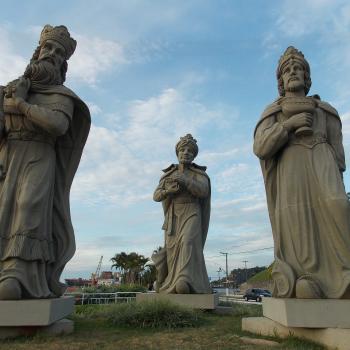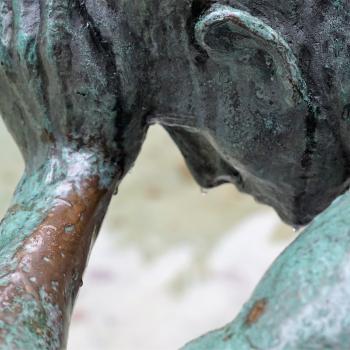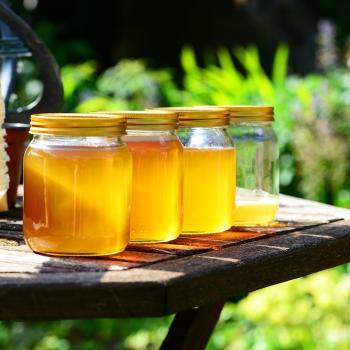God doesn’t give us much time to enjoy Eden. Two chapters of wonder and creative power and beauty, and then over 1,000 chapters of life east of Eden. And that cherubim with the flaming sword meant to guard the gates? We’ve felt the heat of that sword at every turn.
I’ve been pondering my ancestral parents, Adam and Eve, and the gift that keeps on giving – sin. Not a word that’s quick to be used any more, mainly because it’s been abused and abusively used. But there it is, and so hard to escape.
The 4th-century saint, Augustine, spent a lot of time thinking about its ever-present reality in our lives, calling our attachment to it “a cruel necessity of sinning.” We have fault lines running through our wills, rendering us unstable and in constant danger of malevolent realignments in our lives.
On the other hand, more contemporary writers would have us recover the memory and goodness of our Eden selves. Matthew Fox’s Original Blessing challenges the centrality of the Augustinian construct of original sin and bids us look instead at the goodness and beauty of the creation and our place in it. A very compelling vision, really, one that I would like to savor except that I read the newspaper every day. And daily I come up against this thing called sin, out there and in here.
Other writers use a psychological model to redirect our attention away from the reality that the real me is broken. Many use the language of our “true self” and our “false self” to aid us in the effort to acknowledge that once upon a time our selves were good and pure, and that these “selves” we’re stuck with now are not the real ones.
Some use the onion image, the peeling away of the layers of “falseness” to reveal the pure core. This isn’t new. The Enlightenment writer, Montaigne, engaged in the same exercise in his Essais: looking for the real Montaigne beneath all the calcifications of culture, religion, and politics. The “real Montaigne” wouldn’t be hampered by this baggage. Yet, of course, was there a separate Montaigne, pure and uncorrupted, that was accessible? There was not. There was only the one Montaigne, shaped by the experiences and choices of a lifetime, good and bad.
In the same way, the “true self” / “false self” dichotomy can conceal the truth: it isn’t my “false self” that chooses sin – it is in fact my true self. If I peel away all the layers, it will be the same old me, with all my predilections and stubbornness and selfishness. There is no pure “true self” to be found. I am indeed Adam and Eve’s child, wandering in the mists outside of paradise, dodging the flaming sword; knowing good, and knowing evil, yet not being able to really understand how to find my way.
In writing about original sin, Augustine didn’t mean we can’t do good things or make good choices, but that we’re bent, twisted, and even our best efforts are shot through with self-interest. As we say today, in some effort to acknowledge and explain: “It’s complicated.”
And maybe that’s what we need to recognize about the nature of original sin. Setting aside all debates about “total depravity,” and creation’s goodness, and what we once were and what we will someday be, it’s still complicated today, right now. The fruit of the knowledge of good and evil has been that we can no longer tell the difference. And sometimes we aim at good and hit evil. Our desires are all mucked up. And while we’d like to think we could all find common ground and share some essential human identity around a handful of core virtues – compassion and justice, for example – we really can’t. When I look at another human being, the thing I perhaps have most in common with that person is our confusion and complexity, our fear and perplexity.
Perhaps Augustine was overly fixated on the “original sin” model. But he’s not far off the mark. And he understood, oh so well, that only in an honest appraisal of our “true selves” can we lay the broken pieces before the Healer.
I wish now to review in memory my past wickedness and the carnal corruptions of my soul – not because I still love them, but that I may love thee, O my God. For love of thy love I do this, recalling in the bitterness of self-examination my wicked ways, that thou mayest grow sweet to me, thou sweetness without deception! Thou sweetness happy and assured! Thus thou mayest gather me up out of those fragments in which I was torn to pieces, while I turned away from thee, O Unity, and lost myself among “the many.”
We don’t need to name sin as sin to abuse others or ourselves. It has nothing to do with “worm theology.” It has everything to do with opening ourselves up to the whipping wind of God’s grace that blows the mists away and shows us the way to the Tree of Life. And in eating that Tree’s fruit, we find growing within something Edenic. For it ultimately isn’t about the “true self / false self” model, but of the “new self / old self.”
For it is no longer I who live, but Christ who lives in me.













